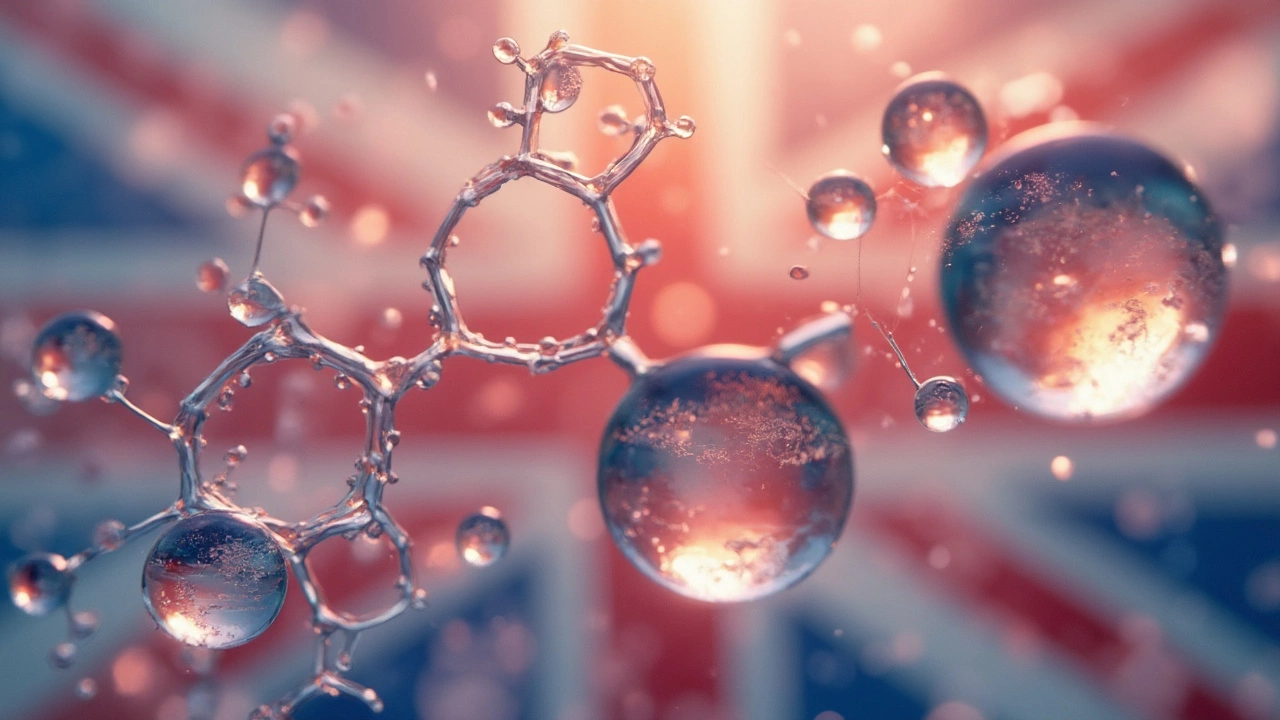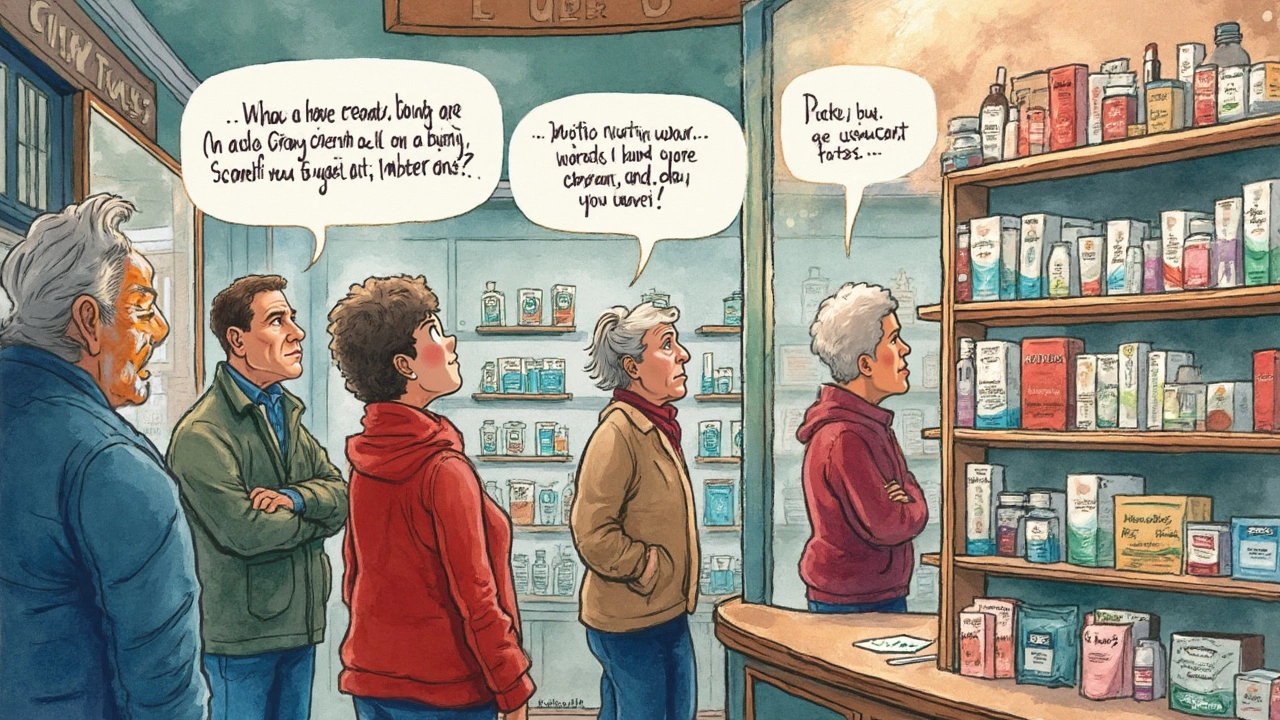Do Anti-Aging Products Really Work? The Truth Behind the Claims
 May, 14 2025
May, 14 2025
Walk down any beauty aisle, and you’ll spot jars promising to erase wrinkles or turn back time. Fancy buzzwords, hefty prices, and celebrity endorsements everywhere. But do those creams and serums actually live up to the hype?
Most people want quick results, but not every ingredient or product is backed by solid research. Sure, retinol and peptides get a lot of buzz, but not everything with a gold label is worth your money. The truth is, some ingredients can make small improvements in how your skin looks and feels, but miracle cures? They don’t exist in a bottle.
If you’re tired of sifting through claims that sound too good to be true, you’re not alone. The trick is knowing what to look for—and what to ignore—before adding another product to your routine. Ready for real talk on what actually works? Let’s break down the facts, ingredient by ingredient.
- The Most Popular Anti-Aging Ingredients – What Do They Really Do?
- What Science Says: Do These Creams Actually Change Skin?
- Big Claims and Bigger Myths: Decoding the Labels
- The Smart Shopper's Guide: What’s Actually Worth Your Money
- Tips for Real Results: Habits That Outlast Any Cream
The Most Popular Anti-Aging Ingredients – What Do They Really Do?
When it comes to anti-aging products, a handful of ingredients keep popping up again and again. But just because something is “in” doesn’t mean it’s actually doing much. So what’s hype, and what’s real?
Retinol: This is hands down the MVP in most dermatologist recommendations. Retinol (a form of vitamin A) helps speed up cell turnover, meaning it nudges your skin to make new, fresher cells. Studies show it can soften fine lines and smooth skin texture after a few months of steady use. Some people see peeling or dryness at first, which usually chills out if you start slow—think every third night, not every night from the get-go.
Peptides: These are tiny proteins that tell your skin to make more collagen. Collagen is what keeps skin bouncy and firm, but we make less of it as we age. Do peptides really plump up the skin? They can help a little, but they’re not miracle workers. Main thing—they’re great for moisture and can make skin look healthier, but don’t expect them to erase deep wrinkles.
Vitamin C: Besides being great in your morning OJ, vitamin C in a serum can help fade dark spots and boost glow. It’s a solid antioxidant, which protects your skin from junk in the air (think pollution) and helps with collagen production. Trick is, vitamin C is fussy—keep it in a dark, airtight bottle, or it may lose its magic.
Hyaluronic Acid: This isn’t an acid in the way you might think. It’s a hydrator—it grabs water and holds it in your skin, making things look plumper and smoother. Great for everyone, but think of it like a tall glass of water for your face. It won’t reverse age, but it helps make skin look more refreshed.
Sunscreen: Not glamorous, but honestly, this is the most essential anti-aging ingredient out there. Daily sunscreen use is proven to slow signs of aging way more than any fancy cream. UVA rays are sneaky—their damage adds up all year, not just at the beach.
| Ingredient | Main Benefit | What Research Shows |
|---|---|---|
| Retinol | Smoother skin, fewer fine lines | Can improve texture and reduce wrinkles in 3-6 months |
| Peptides | Firmer, more hydrated skin | May boost collagen but results are mild |
| Vitamin C | Brighter skin, fades dark spots | Supports collagen, evens tone if formula is stable |
| Hyaluronic Acid | Hydrates, plumps skin | Reduces dryness immediately, effects are temporary |
| Sunscreen | Prevents new damage | Consistent use proven to slow visible aging |
If you want to keep things simple, focus on sunscreen in the morning, retinol (or peptides if retinol irritates you) at night, and a hydrating product with hyaluronic acid any time. Add vitamin C if you’re fighting dark spots or just want a glow-up boost.
What Science Says: Do These Creams Actually Change Skin?
If you ask a skin doctor, most will admit there's a real gap between marketing promises and actual results. A few ingredients in anti-aging creams do have some research behind them, but their power shouldn’t be overblown.
Retinol stands out because it’s one of the few things that’s been tested over and over and still shows up with real results. Studies suggest it can help boost collagen, smooth fine lines, and even out skin tone with regular use. But don’t expect a facelift in a jar—improvements are usually subtle and happen over months, not days.
Peptides are another buzzword. They’re supposed to tell your skin to make more collagen. Some small studies hint at firmer skin after several weeks, but these aren’t life-changing results. And vitamin C? It’s a solid antioxidant, can help with brightness, and may fade some dark spots if used every morning. Again, nothing dramatic overnight.
On the other hand, there’s hyaluronic acid. It won’t erase wrinkles, but it’s a top-notch hydrator. Skin looks plumper and smoother because it holds onto water, not because it’s magically erasing years. It’s great for a short-term boost but doesn’t change your skin in the long run.
The stuff you need to watch out for: plant extracts and rare oils that sound fancy but often lack any real proof. A pretty package doesn’t mean much if there’s no peer-reviewed study backing it up.
- Retinol: proven, but don’t expect miracles
- Peptides: mild firming, works slowly
- Vitamin C: protects, brightens, evens tone over time
- Hyaluronic acid: hydrates, gives quick (temporary) plumping
So, do these creams really change your skin? Sometimes yes, but with small gains and never as fast as ads say. The key is patience—results show through small daily wins, not sudden makeovers.

Big Claims and Bigger Myths: Decoding the Labels
Let’s be real: most anti-aging products scream about "clinically proven results" or say you’ll "look 10 years younger in one week." Sounds tempting, right? But marketing language is loaded with loopholes. Companies often use words like “reduces the appearance of wrinkles” instead of “removes wrinkles” for a reason—it’s all about hedging bets legally, because surface changes don’t mean actual skin repair.
Here’s the lowdown. The FDA treats most anti-aging creams as cosmetics, not drugs, so companies don’t need to prove they work. As long as a cream doesn’t claim to change your body structure or function, it’s fair game to jazz up the promises. If they claim “clinically proven,” sometimes that just means someone, somewhere, saw a little improvement in a tiny study. It’s not a guarantee you’ll see magic.
- If you see “dermatologist recommended” on a label, ask yourself: how many dermatologists? Sometimes it’s just a handful, not the entire profession.
- Serums that brag about being “natural” or “chemical-free” are just playing on fears. Water is a chemical. “Natural” ingredients can irritate skin, too. Always check for potential allergens or irritants.
- Words like “patented formula” or “exclusive peptide blend” often just mean some unique mix the company came up with—not that it’s better or proven.
Watch out for products with gold flakes, caviar, or diamond dust. Sure, they sparkle and sound fancy, but studies haven’t shown they stop aging. Often, what really helps is good old sunscreen or retinol, not luxury extras.
| Common Claim | What It Really Means |
|---|---|
| “Reduces the appearance of wrinkles” | Often just plumps the skin for a few hours |
| “Clinically proven” | Based on small or weak studies, not always reliable |
| “Dermatologist recommended” | Might refer to a single doc or a paid spokesperson |
| “Patented formula” | Unique blend, not necessarily better or effective |
One of the best tips is to ignore the shiny labels and go straight to the ingredient list. Look for active stuff like retinol, vitamin C, and sunscreen. If the rest is just perfume, glitter, or fancy packaging, it’s probably more about marketing than results. Don’t drop major cash just for a pretty bottle.
The Smart Shopper's Guide: What’s Actually Worth Your Money
There’s no reason to drop hundreds on a cream when a handful of ingredients have proven track records. To shop smart, you want to focus on what science says actually works—and sidestep the stuff that’s just clever marketing.
First up, look for products with retinol (which is a form of vitamin A). Dermatologists often call this the gold standard for fighting fine lines and uneven skin tone. Retinol boosts skin cell turnover and has years of data behind it—not just glowing online reviews. Another ingredient with real muscle is sunscreen. Seriously. Nothing prevents aging like daily sun protection. Even the fanciest anti-aging product can’t fix the damage from skipping SPF.
Next, peptides and antioxidants (like vitamin C) have some solid evidence, too. They help support the skin’s natural repair process and can make skin look brighter or smoother. But be careful—just because a label brags about ‘collagen’ doesn’t mean it’ll do anything. Collagen molecules in a jar are usually too big to actually soak into your skin.
Don’t buy anything just because a celebrity swears by it, and don’t assume a higher price means it works better. Drugstore brands can be just as effective as expensive ones if they contain the right actives. If you ever see claims like “reverse aging overnight,” run. There’s no magic in a jar, just ingredients that help a bit over time.
Here’s how to make your next anti-aging buy count:
- Scan for retinol, vitamin C, peptides, niacinamide, and hyaluronic acid.
- Check the ingredient list for SPF 30 or higher if you’re grabbing a daytime product.
- Avoid fragrance and irritants if your skin is sensitive.
- Look for clinical study references, not just before/after photos.
- Pay more attention to texture and feel—if you hate how it feels, you probably won’t keep using it.
Dermatologist Dr. Ranella Hirsch summed it up perfectly:
“Consistency matters more than price or packaging. The best anti-aging routine is the one you actually stick with.”
So slow down before you swipe your card for something new. Find products with proven ingredients, use them every single day, and remind yourself that even the best jar won’t work if it stays sealed on your shelf.

Tips for Real Results: Habits That Outlast Any Cream
Let’s be real—no anti-aging product makes up for daily habits. The small stuff you do every day matters way more than any miracle cream. Over-the-counter serums can take you so far, but your routine is what really gives results you can see and feel.
- Sunscreen is non-negotiable. Sun damage ages skin faster than anything else. Broad-spectrum SPF 30 (or higher) every single day—even when it’s cloudy or you’re just running errands—can prevent wrinkles, dark spots, and even skin cancer.
- Skip the cigarettes. Smoking actually breaks down collagen, so even pricey wrinkle creams can’t fix what cigarettes break. People who smoke often start getting fine lines in their twenties and thirties.
- Hydrate inside and out. Dry, dull skin looks older. Drink enough water, moisturize after washing your face, and use gentle, non-irritating cleansers so you’re not stripping away natural oils.
- Eat for your skin. Pack your meals with vitamin C, E, and healthy fats from nuts, seeds, and oily fish. These help fend off damage from pollution and boost your skin’s repair process.
- Sleep is underrated. Your skin repairs itself while you sleep. Aim for 7-8 hours every night. Less than that and you can expect dark circles and dull-looking skin, no matter what product you slather on.
- Don’t go overboard with exfoliation. Scrubbing too much or using strong acids can actually speed up aging by irritating your skin and breaking down the protective barrier.
Here’s a look at how some of these habits compare in terms of their impact, according to years of dermatology research:
| Habit | Estimated Impact on Visible Aging |
|---|---|
| Wearing Sunscreen Daily | Reduces photoaging by up to 24% over 4.5 years (based on a 2013 study in Annals of Internal Medicine) |
| Smoking Cessation | Stops collagen breakdown, reducing premature wrinkles significantly within 6-12 months |
| Consistent Sleep (7-8 hrs) | Associated with 30% more skin barrier recovery after UV exposure |
| Antioxidant-Rich Diet | Improves skin elasticity and thickness over 6 months according to European Skin Health Survey |
So, before reaching for another anti-wrinkle jar, look at what you’re doing every day. The right habits add up—and honestly, they out-perform most products on the market when it comes to real, lasting results.
